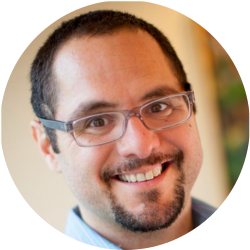Martin Buber and the Life of Dialogue

Martin Buber (1878–1965) is one the most influential thinkers of the twentieth century. This ICJS miinicourse explores Buber’s notion of dialogue as expressed in his corpus of writing, ranging from comparative mysticism to biblical commentary, existentialism to poetry, philosophy to cultural Zionism, and psychology to diplomacy. Buber artfully guided his readers beyond the conventional confines of east-west and religious/non-religious through the myriad sources and influences that comprise the experiences, themes and aspirations of his 1923 magnum opus, I and Thou.
In the six videos in this course, we not only study his classic work, but we also read his works on Hasidism, mysticism, exegesis, as well as his ruminations on Zionism and the Israeli-Palestinian impasse. We consider how Buber’s views on dialogue can inform not only our own, but also how religious and political leaders can work together toward achieving this complicated, yet also simple dialogical orientation to the “Thou.” We also consider how the life of dialogue both disorients and enriches our lives.
About the Instructor
 Ben Sax, Ph.D., serves as the Head of Scholarship and the Jewish Scholar at the Institute for Islamic, Christian, and Jewish Studies in Baltimore. Ben is an experienced professor, university administrator, scholar, award-winning teacher, public speaker, and practitioner and facilitator of interreligious dialogue. Before arriving at the ICJS, Ben was director of the Malcolm and Diane Rosenberg Program in Judaic Studies and the founding faculty principal at the West Ambler Johnston Residential College at Virginia Tech in Blacksburg, Virginia. In addition to publishing on topics relating to Jewish philosophy, German-Jewish history and culture, Jewish-Christian relations, and interreligious dialogue, Ben has discussed his work on PBS and Baltimore’s NPR affiliate WYPR. He is the author of “Winged Words: Benjamin, Rosenzweig, and the Life of Quotation.”
Ben Sax, Ph.D., serves as the Head of Scholarship and the Jewish Scholar at the Institute for Islamic, Christian, and Jewish Studies in Baltimore. Ben is an experienced professor, university administrator, scholar, award-winning teacher, public speaker, and practitioner and facilitator of interreligious dialogue. Before arriving at the ICJS, Ben was director of the Malcolm and Diane Rosenberg Program in Judaic Studies and the founding faculty principal at the West Ambler Johnston Residential College at Virginia Tech in Blacksburg, Virginia. In addition to publishing on topics relating to Jewish philosophy, German-Jewish history and culture, Jewish-Christian relations, and interreligious dialogue, Ben has discussed his work on PBS and Baltimore’s NPR affiliate WYPR. He is the author of “Winged Words: Benjamin, Rosenzweig, and the Life of Quotation.”